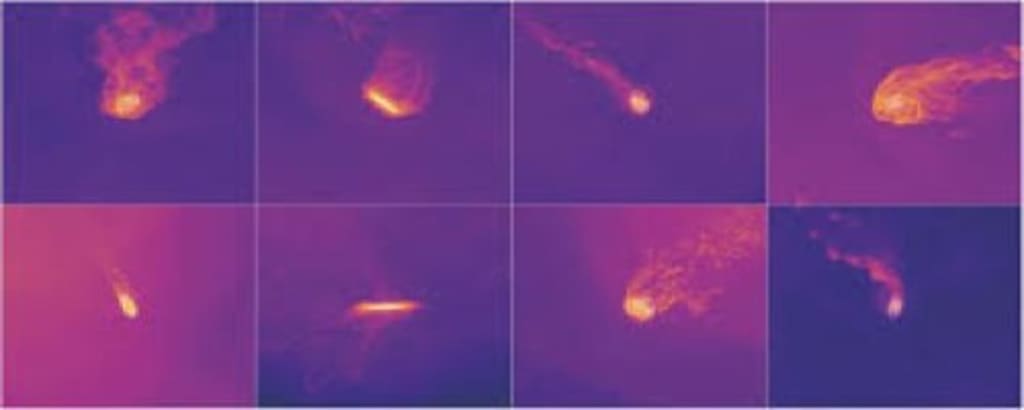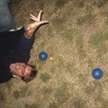
Brothers Noah and Steve walked into the jellyfish exhibit in the aquarium. Noah was twenty-two, Steve was twenty-five. Tubes that ran from the ceiling to the floor held jellyfish as well as glass containers mounted in the walls. Blue ripples lighting made a watery effect on the floor. The lights in the tubes and cases changed from aqua marines to blues to lavenders to reds and greens. The jellyfish floated oblivious to the changing lights, their movements like a pulse from a hand clenching and unclenching. The jellyfish were average human hand sized and milky almost transparent white. Or lungs breathing. Noah took out his iPhone and filmed. Steve noticed the filming and looked at the display with narrower eyes and a head slightly tipped, trying to see the art his brother saw.
“Are you talking pictures or filming?” Steve asked.
“Filming,” Noah answered.
“Why?”
“It’s pretty,” Noah said. “It’s like art.”
Steve shrugged. “It’s like art or it is art?”
“It’s beautiful,” Noah said. “Tranquil. Hypnotic.”
“So, art?” Steve said. He added: “I wish you could get high here. Shrooms maybe. It’s like being inside a lava lamp kind of.”
“Yeah, kind of,” Noah said. “Gets your mind off things. I sometimes wish I were a jellyfish.”
Steve snorted a laugh then covered his mouth a bit embarrassed by the loud outburst. Smooth trance like ambient music played.
“They don’t have brains,” Steve said.
“You don’t have a brain,” Noah joked.
“Sure,” Steve said.
Norah scratched his chin. “It’s weird. An animal without a brain. How is that not a plant then?”
“Barnacles are animals without brains,” Steve said.
“And you,” Norah joked again.
“Too easy,” Steve said. “You just used that joke. You can’t use it again. Maybe you don’t have a brain. But going back, how are they not floaty plants?”
Noah shrugged. “They eat and reproduce.”
“But so do plants,” Steve said. “Some plants eat insects. How are they not animals?”
“This is stupid but I’m going to Google it,” Noah said. He took out his phone and Googled: “why are jellyfish animals and not plants.” While his thumbs hit the screen a memory stuck him and he said: “Oh yeah, actually I read that baby jellyfish do have brains. Neurons or whatever. But then they lose them because they don’t need them anymore. But they do when they’re babies.”
Steve scratched the side of his face. “Huh. That sounds like a metaphor for something. Not exactly sure what. But going back to this display being art or whatever. I mean, that’s kind of messed up? If they’re living animals. Imagine a alien species gathered a bunch of humans and put them in a room with changing flickering lights that they danced around too.”
“That’s called a rave,” Norah said looking down at his phone. “Raves are art.”
“Are raves still a thing,” Steve asked.
Norah shrugged.
“What’s your phone say?” Steve asked. “And why didn’t you ask Siri?”
“Jellyfish aren’t really fish either,” Norah said.
“Yeah no duh,” Steve said.
“Yeah, I know,” Noah said. “I just forgot.”
He clinked on a link. Okay, a post from some website by some biologist says this. He read: “Jellyfish are very simple organisms, but they definitely meet the six requirements for being an animal.
Biological Order. Yes, their cells work in harmony.
Reacting to Changes in the Environment. Jellyfish will respond to being hurt, prey approaching, and many other external stimuli.
Movement. Yep, that one’s pretty self-explanatory.
Growth. Jellyfish have a few different life stages.
Use of energy. Jellyfish eat and expel waste.
Reproduction. They can release sperm to form planulae..” After reading he crinkled his nose. “Kind of a unsatisfactory answer. I mean I guess that all makes sense and stuff I already knew. I guess that’s why it’s a bit dissatisfying, like, I already knew all that. But still, how can you be an animal without a brain? Also I think she’s wrong about jellyfish being able to feel pain.”
“You saying you know more than a biologist?” Steve challenged.
“The internet here claims she is by her own self identifying but she’s just a random poster on some random site; she could or could not be.”
“Weird that’s the top search then,” Steve said.
“Yeah,” Norah said. “Another post here is a answer to a question, “why are bats considered mammals if mammals don’t have wings.” Which is just stupid. It’s a stupid question. Some mammals do have wings. Just like some mammals have blow holes. Jellyfish are invertebrates, which I already knew of course. Coral are technically animals too.”
“Those rocks things,” Steve said.
“Yeah,” Noah said. “Anyways, this question made me think we asked a stupid question here too.”
“It’d be nice to not feel any pain,” Noah said.
“But then how do you know if you really live?” Steve asked. “Not just physical pain but emotional pain. Just natural reactions to living.”
“Whether you think you live or not, you still live,” Noah said. “Like these Jellyfish. They don’t have brains. They don’t know if they live or not. That’s something only brains can ponder. They don’t know what they look like.”
“Do they have eyes?” Steve asked.
“Yeah,” Norah said. “On their tentacles, I think. But even if they see their reflection, or see others like themselves, and they do look all the same—”
“Wow racist,” Steve joking interjected.
Norah sort of laughed and rolled his eyes. “But anyways… I forgot my point.”
“What is art?” Steve said teasingly. “Can nature really be art, or isn’t art an interpretation of nature through an artists or creator’s filter? Whether it be painting or photography or words or whatever. Art is interpretation of reality, not reality. Therefore, reality cannot be art. Right? I threw that off as a joke but that’s actually a deep question, right?”
Noah shrugged. “I don’t know, maybe, not really” He had been scrolling and reading a bit on his phone while they talked. “I found an article from some stie called “History Today” from 2020 written by… um, Alexander Lee.”
Steve smirked. “You don’t have to site all that; I’m not a professor who cares about proper citation.”
“Anyways,” Noah said, “it’s too long to read the whole thing at the moment and I guess I don’t really care deeply enough about the question to read all that, but the third paragraph is sort of interesting. It says: “‘Incomplete’
By the time of Anna’s death, biologists had already been puzzling over jellyfish for well over 2,000 years. Among the earliest was Aristotle. With his characteristic love of order, he had divided all forms of life into three categories, based on their vital functions. At the bottom of the scala naturae (‘ladder of nature’) were plants, which possessed only the nutritive and reproductive faculties. Above them came animals, which had perception as well. And at the very top, he placed humans, who had reason. It all seemed pretty straightforward. But there was a hitch. Although most creatures could be slotted into one category or another without much difficulty, there were a few which didn’t seem to fit. Of these, jellyfish were the most troublesome. Given that they lacked perception, they clearly weren’t animals. But since they weren’t attached to anything, they weren’t plants, either.
The problem wasn’t jellyfish themselves; it was Aristotle’s schema. However intuitive it might have seemed; its categories were simply too narrowly defined. As even Aristotle seems to have recognized, animals and plants were distinguished by more than just perception. Life just wasn’t that simple. But he still refused to give up on his system. Flawed though it may have been, it still worked for most forms of life. And since his goal was merely to identify different genera, he saw no need to change it just for the sake of a few outliers. He therefore dismissed jellyfish as ‘incomplete’ anomalies.”
Norah read that out loud. Steve shrugged. “Huh. Yeah.” Steve took out his phone. “Siri, why are jellyfish considered animals and not plants?”
“Here’s what I found,” Siri answered back and pulled up a few websites.
“I got the same article you read from,” Steve said. “The Jellyfish problem.” He put the phone back in his coat pocket.
“You’re disappointed?” Noah asked.
Steve shrugged. “I was sort of hoping that Siri would tell me instead of forcing me to read something. Or tell me a joke or something. It sounds like a joke set up.”
Noah shrugged. “Maybe it is really?”
“Computers think and reason,” Steve said. “Does that make them alive? More alive than jellyfish?”
“That’s a stupid question,” Norah said.
“Is it though?”
Steve and Noah silently stared at the jellyfish display in the aquarium as the colors bled from greens to blues to purples to reads as the jellyfish floated tranquility in the water oblivious to everything. Their minds drifted to lighter, prettier dreamy gauzy topics. Outer space and pretty faces and crushes and that one girl and that one song and nature and their pets dogs and the sun in Florida and California and tropical beaches and winning the lottery and her wet in that swimsuit, raising up from the pool, and that good meal in that fancy restaurant that one time and that pickup game where he threw that ally-oop to that one cool guy who dunked it and smiled at him while pointing knowingly like they shared a secret and the inside joke involving their parents being stern and that one girl and holidays and vacations and sunsets and the colors of fluffy floating clouds in sunsets, vibrant reds, oranges and purples and that girl in art class in college and things.
Wouldn’t it be nice to float. Feel no pressure. No responsibilities. No expectations. No heaviness. No anxieties. No obligations. No deadlines. No stress. No jobs. No money. Just float in the either. As water and colors wash over you, but you’re not even aware of water or colors. You just are. Just there floating, peacefully, forever. No brains. No nothing, and that is everything, forever. Ignorance is bliss. Just float.
About the Creator
Enjoyed the story? Support the Creator.
Subscribe for free to receive all their stories in your feed. You could also pledge your support or give them a one-off tip, letting them know you appreciate their work.






Comments
There are no comments for this story
Be the first to respond and start the conversation.